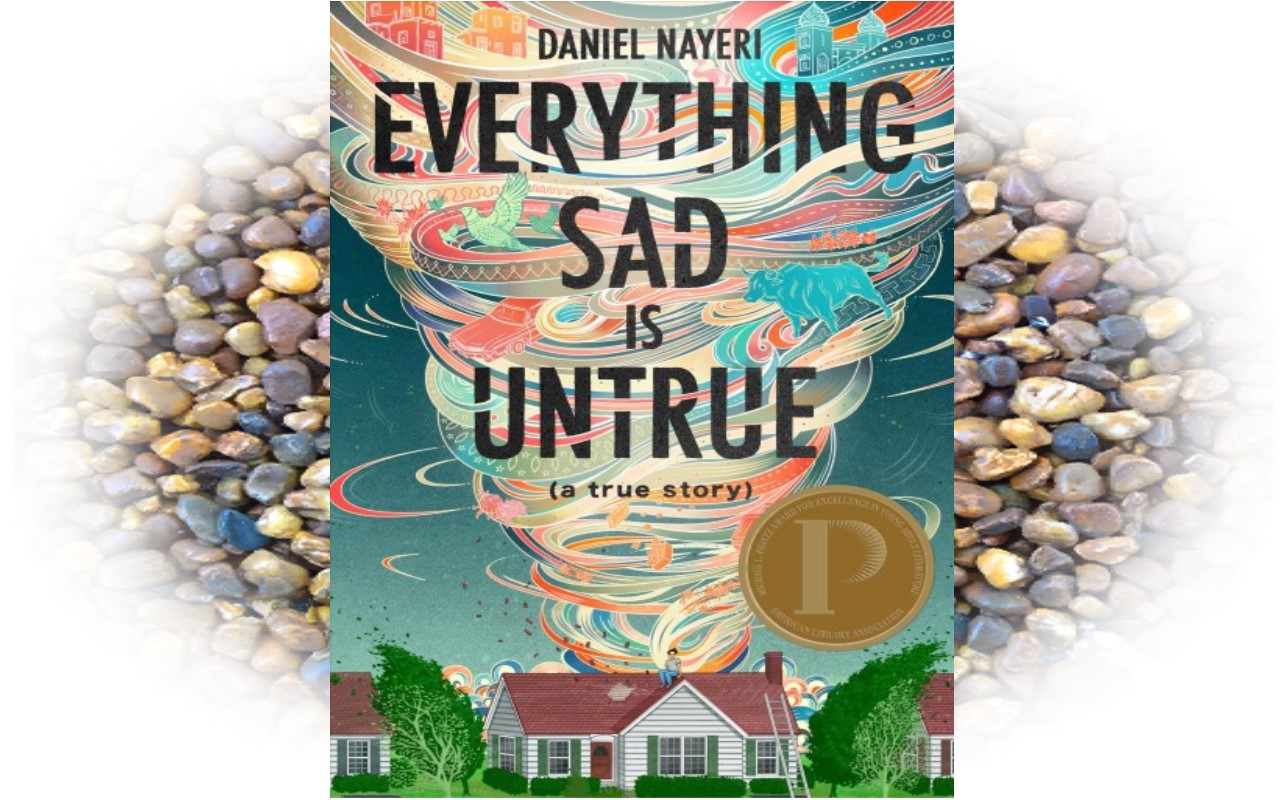
Hạnh phúc Nowruz! This month, you are reading a book written by a Persian author in celebration of Nowruz.
Our book this month had a profound effect on me. I kept returning to the book to jot down notes about various concepts and people. I jotted down pages where I found different ideas and thought about those ideas for some time. While I read this book, I was able to view an unfamiliar world from my own. I've found that when I am viewing an unfamiliar world, it is okay to write down things that puzzle me so that I can either research or think about the puzzle later.
Mọi điều buồn đều không có thật by Daniel Nayeri was originally meant to be published as an adult tự truyện, which is a genre in non-fiction. After advice from his publisher, he thought it was best to publish his book in his middle school voice, which was more relatable. He has changed some names and events in order to publish the book as a hư cấu làm việc.
When you were younger, you may have checked out the Folk and Fairy Tale section in the Picture Book Area, which is located in the Children's Area of each of our libraries. In that section, you may have read about legendary characters like Paul Bunyan, ví dụ.
Daniel talks about some of his own legendary (larger than life) ancestors and relatives:
- Grandfather Baba Haji, who slew a bull
- Great Grandmother Aziz, whose life was stolen by her greedy uncles
- Grandmother Ellie who was exiled to England
- Uncle Reza and his motorcycle and Uncle Askar and the pheasant hunt
- Lionheart Mom and the Death Warrant
- Sister, who almost lost her finger
If you think about your relatives, you will probably remember stories that you heard about certain relatives that seem legendary, like Daniel's.
As a storyteller, Daniel likes to use the number three a lot. For instance, when he talks about immigrants, he says that they think that the streets are paved in gold. When Những người nhập cư get to America, he says their perception changes to three observations:
- "The streets were not paved with gold."
- "The streets were not paved at all."
- "They were the ones expected to do the paving."
Daniel's "Three" Storcác Bên
Daniel's focus as a middle-grader often focuses on food and poop. He relates in great detail about the chocolate-coconut candy that he enjoyed in Iran called Orich, which cannot be found here. Does Orich sound like an American candy you know? Daniel recounts three stories related to desserts.
Here are Daniel's other "Three" storý:
- He feels that Ba Tư (now Iran) love stories are tragic. Have you heard of Romeo và Juliet? It is considered a tragedy because of its ending.
- Daniel has great respect for his mother, who he calls "unstoppable." Find out why he thinks she is "unstoppable."
- Escaping Iran was the result of three airport "miracles." If not for these "miracles," Daniel and his family would not have been allowed to leave Iran.
You will find additional ideas that he has grouped in threes such as how to stay safe on a bus and how to nail down shingles during a storm.
If you are curious about writing and literary devices like Daniel's "three stories," check out the section on our website that has databases for Reading, Literature and Self-publishing.
Cuộc sống trên đường chạy
As an immigrant, Daniel and his family have much to learn as they stop at various places before they finally settle in Edmond, Oklahoma.
As an example of how life is for an immigrant, Daniel shows us what one day in Edmond, Oklahoma looks like on pages 137-157.
Daniel's middle school persona focuses on humorous stories about food and poop. Did you know you can tell how rich someone is by what they eat and how they poop?
Daniel recounts the harrowing tale of how his family left Iran and finally settled in America:
- Turning to Christianity in an anti-Christian government like Iran.
- Daniel and his family first land in Dubai, United Arab Emirates. Being a vulnerable immigrant in a rich country like the United Arab Emirates can be difficult.
- Before they arrive in the United States, Daniel recounts the time spent at the Hotel Barba in Italy, while the family waits to see which country will accept them as immigrants. He recounts the following stories about life in this "holding area":
- Ali Shekari and his life as a Kurd
- Having to survive by lying and stealing
- Waiting and the hopelessness that one feels as a người tị nạn
- Education as a way to lift oneself from poverty
A Christian couple chose to house the family, for which Daniel is forever grateful.
Questions to Think About:
- What do you think about Daniel's father, who chose to stay in Iran?
- Why do you think Daniel's father chose to stay in Iran?
- Why do you think the author chose not to use chapters in his book?
- What does the author mean when he says "the patchwork memory is the shame of a refugee"?
- Why do you think Daniel does not tell us what his sister's name is until the end of the book?
- How do you think the life of refugees and immigrants can be made better?
Next month, we will read Khi bạn bẫy một con hổ by Tae Keller in celebration of Asian American and Pacific Islander Heritage Month.
Let me know if you have any questions below in the comments!



Add a comment to: Ms. Ila’s Middle Grade Reading Club: Everything Sad is Untrue by Daniel Nayeri